
Current Fungal Infection Reports
Scope & Guideline
Illuminating the path to better diagnosis and treatment.
Introduction
Aims and Scopes
- Clinical Management of Fungal Infections:
The journal emphasizes the clinical aspects of fungal infections, including diagnosis, treatment, and management strategies for various patient populations, particularly those who are immunocompromised or have underlying health conditions. - Epidemiology and Public Health:
A core focus is the epidemiological study of fungal infections, investigating their prevalence, risk factors, and the impact of social determinants on health outcomes, especially in vulnerable populations. - Emerging Fungal Pathogens and Resistance:
The journal addresses the emergence of new fungal pathogens and the growing concern of antifungal resistance, providing insights into molecular mechanisms and strategies for overcoming these challenges. - Innovative Diagnostic Techniques:
There is a strong emphasis on the development and evaluation of novel diagnostic methods for fungal infections, including molecular testing and serology, aimed at improving early detection and treatment outcomes. - Impact of Environmental Factors:
Research on how environmental changes, including climate change, influence the epidemiology of fungal diseases is a unique contribution, linking ecological factors with public health.
Trending and Emerging
- Impact of COVID-19 on Fungal Infections:
There is a significant increase in research exploring the relationship between COVID-19 and fungal infections, particularly mucormycosis and candidiasis, reflecting the pandemic's influence on fungal disease epidemiology. - Social Determinants of Health:
Emerging studies focus on the social determinants of health as they relate to fungal infections, aiming to identify disparities in infection rates and treatment outcomes among different populations. - One Health Approach:
The integration of One Health perspectives, which consider the interconnectedness of human, animal, and environmental health in the context of fungal infections, is gaining traction, highlighting the need for interdisciplinary research. - Antifungal Stewardship:
There is a growing emphasis on antifungal stewardship, particularly in immunocompromised patients, to address the challenges of antifungal resistance and optimize treatment protocols. - Innovations in Diagnostics:
Recent publications are increasingly focused on advancements in diagnostic technologies, including rapid molecular testing and serological assays, which are critical for timely and accurate diagnosis of fungal infections.
Declining or Waning
- Historical Fungal Infections:
There is a noticeable decrease in publications focusing on historical aspects or case studies of traditional fungal infections, as current research tends to prioritize novel pathogens and contemporary issues. - Basic Mycology Research:
Research that primarily explores fundamental mycology without clinical or epidemiological implications has become less frequent, as the journal shifts toward more applied and translational research. - Non-clinical Laboratory Studies:
There seems to be a waning interest in non-clinical laboratory studies of fungal biology that do not directly inform clinical practice or patient care, as the emphasis moves towards studies with immediate clinical relevance.
Similar Journals
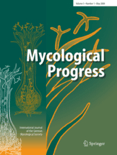
MYCOLOGICAL PROGRESS
Transforming our understanding of fungi and their ecosystems.MYCOLOGICAL PROGRESS, published by SPRINGER HEIDELBERG, is an esteemed journal dedicated to advancing the field of mycology and associated biological disciplines. With an ISSN of 1617-416X and an E-ISSN of 1861-8952, this journal has established itself as a leading source of high-quality research, evidenced by its impressive rankings in the Q1 quartile across various categories such as Agricultural and Biological Sciences, Ecology, and Plant Science. As of 2023, MYCOLOGICAL PROGRESS ranks 37 out of 193 in Agricultural and Biological Sciences (miscellaneous) and 183 out of 721 in Ecology, demonstrating its significant impact in the ecosystem of scientific literature. This journal not only aims to disseminate innovative research findings but also strives to foster interdisciplinary collaboration among scientists, ecologists, and agriculturists around the globe. While retaining a traditional model of publication, MYCOLOGICAL PROGRESS remains crucial for those seeking to deepen their understanding of fungal biology and its broader environmental implications.

Mycosphere
Fostering collaboration for innovative fungal discoveries.Mycosphere is a premier open-access journal published by MYCOSPHERE PRESS, dedicated to advancing the field of mycology and contributing significant insights into ecological and plant sciences. Established in 2010 and headquartered in Guiyang, China, this journal has carved out a vital niche, achieving remarkable rankings in the Scopus database—#3 in Ecology, Evolution, Behavior and Systematics and #4 in Plant Science, both boasting a 99th percentile ranking. With an unwavering commitment to disseminating high-quality research, Mycosphere serves as a critical platform for researchers, professionals, and students alike, encouraging robust dialogue and collaborations across the global scientific community. The journal's accessibility, coupled with its impact factor and Q1 categorizations in 2023 for both ecology and plant sciences, substantiate its role as an essential resource for cutting-edge studies and innovations in the field.
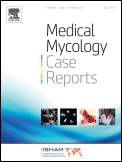
Medical Mycology Case Reports
Connecting the dots between diagnosis and treatment in mycology.Medical Mycology Case Reports, published by Elsevier, is a pivotal journal dedicated to advancing the field of mycology through the presentation of case reports that highlight clinical findings, diagnostic challenges, and treatment outcomes associated with fungal infections. With its ISSN 2211-7539 and E-ISSN 2211-7539, this open-access journal has been serving the global community since 2012, allowing unrestricted access to its valuable insights. Situated in the Netherlands, specifically at RADARWEG 29, AMSTERDAM, this journal has gained recognition in areas such as Infectious Diseases (ranked Q3) and Microbiology (ranked Q4) as of 2023. Its commitment to disseminating high-quality research is reflected in its Scopus rankings, which place it at the 51st percentile in Medicine and the 32nd percentile in Immunology and Microbiology. By bridging the gap between clinical cases and academic research, Medical Mycology Case Reports plays a crucial role in enriching the knowledge base of practitioners and researchers alike, ultimately contributing to improved patient management and public health.

Journal of Pediatric Infection
Transforming pediatric care with cutting-edge insights.Journal of Pediatric Infection is a vital academic resource dedicated to the ever-evolving field of infectious diseases in pediatric populations. Published by AVES YAYINCILIK in Turkey, this journal features a rigorous peer-review process and has established itself as a platform for innovative research from around the globe. Although currently categorized in the Q4 quartile for both Infectious Diseases and Pediatrics, Perinatology and Child Health, the journal's potential for growth is substantial, attracting contributions that aim to shed light on the complexities of infectious diseases affecting children. With a converged publication history from 2009 to 2024, the journal emphasizes the importance of advancing knowledge in pediatric health through systematic reviews, original research, and case studies. Its open access policy encourages unrestricted sharing of vital research findings, making it an essential read for researchers, clinicians, and students dedicated to improving pediatric healthcare outcomes.
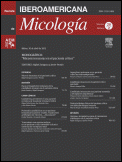
REVISTA IBEROAMERICANA DE MICOLOGIA
Bridging Gaps in Mycology for a Healthier FutureREVISTA IBEROAMERICANA DE MICOLOGIA, published by the ASOCIACION ESPANOLA MICOLOGIA-AEM, is a vital resource for those engaged in the study of mycology and infectious diseases. With a history spanning from 1996 to 2024, this journal is committed to advancing knowledge in the field through the dissemination of high-quality research articles, reviews, and case studies. Although it currently features a Q3 ranking in Infectious Diseases and a Q4 ranking in Microbiology for 2023, its impact is significant given the niche focus it serves, catering to a specialized audience of researchers and practitioners. While access is not open, the journal continues to be a preferred platform for scholarly communication among professionals in Spain and beyond. The editorial office, located in Bilbao, serves as the hub for rigorous peer-review and publication processes, ensuring that the latest advancements and findings in the field of mycology are effectively shared within the scientific community.
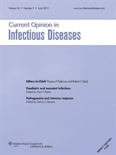
CURRENT OPINION IN INFECTIOUS DISEASES
Illuminating the Path Forward in Infectious Disease UnderstandingCURRENT OPINION IN INFECTIOUS DISEASES, published by Lippincott Williams & Wilkins, is a premier journal that focuses on the latest developments and understanding in the field of infectious diseases. With its ISSN 0951-7375 and E-ISSN 1473-6527, this journal has gained recognition for its pivotal role in advancing knowledge from 1988 to its current publications in 2024. Boasting an impressive Q1 ranking in both Infectious Diseases and the Medical Microbiology category, it holds a reputable position among the top journals in the field. The journal serves as an essential resource for researchers, professionals, and students alike, providing them with timely reviews, analyses, and perspectives that shape contemporary practice and policy. While lacking open access options, it ensures a critical examination of emerging trends and unique insights that foster informed discussions. With its consistently high impact factor, CURRENT OPINION IN INFECTIOUS DISEASES remains a vital platform for thought leaders and innovators navigating the complexities of infectious disease research.

Therapeutic Advances in Infectious Disease
Pioneering progress in infectious disease pharmacology.Therapeutic Advances in Infectious Disease is a distinguished journal published by SAGE Publications Ltd, dedicated to advancing knowledge in the vital field of infectious diseases and pharmacology. With an impactful Open Access model since 2019, the journal facilitates unrestricted access to a wealth of high-quality research, enabling researchers, clinicians, and educators to stay at the forefront of infectious disease management and treatment. As a recognition of its contribution to the scientific community, the journal holds a prestigious Q1 quartile ranking in both Infectious Diseases and Medical Pharmacology as of 2023, underscoring its influence and relevance in these domains. The journal is positioned favorably within the Scopus rankings, with an impressive standing in the diverse categories of Medicine, emphasizing its commitment to disseminating innovative research. Through a rigorous peer-review process and a broad scope that covers therapeutic advancements, Therapeutic Advances in Infectious Disease serves as an essential resource for anyone involved in combating infectious diseases, offering insights that drive clinical applications and enhance patient care.

SYDOWIA
Illuminating Pathways in Ecology and EvolutionSYDOWIA is a prestigious academic journal based in Austria, published by Verlag Ferdinand Berger Sohne Gesellschaft mbH, that has been a cornerstone of scientific publishing since its establishment in 1996. With an ISSN of 0082-0598, SYDOWIA focuses on critical research in the fields of Ecology, Evolution, Behavior and Systematics as well as Plant Science, earning a notable classification in Category Quartiles with Q3 in Ecology-related disciplines and Q2 in Plant Science for 2023. The journal’s strategic insights into agricultural and biological sciences have secured a place within the Scopus rankings, where it holds the position of #191 out of 516 in Plant Science and #278 out of 721 in Ecology categories—reflecting its growing influence with a percentile standing of 63rd and 61st, respectively. Although SYDOWIA is not an Open Access journal, it continues to thrive in delivering scholarly articles that promote advancement and innovation in ecological and botanical research. Researchers, professionals, and students alike can rely on SYDOWIA as a vital resource for disseminating knowledge and fostering exploration in these essential scientific domains.
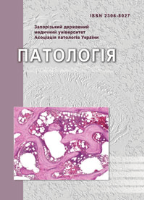
Pathologia
Empowering Research for a Healthier TomorrowPathologia is a prominent open-access journal dedicated to advancing the field of clinical and experimental pathology, published by ZAPORIZHZHYA STATE MEDICAL UNIVERSITY. Established in 2013, the journal aims to provide a platform for researchers, clinicians, and students to share innovative research, case studies, and reviews that are critical to understanding disease mechanisms and improving diagnostic and therapeutic strategies. With a steady commitment to high-quality research dissemination and accessibility, this journal serves as an essential resource for those in the medical and health sciences fields. Researchers engaging with Pathologia can explore a diverse range of topics, including histopathology, molecular pathology, and laboratory medicine, promoting both scholarly discussion and practical applications. The journal's open-access model ensures that vital research findings are freely available to the global academic community, fostering a collaborative environment that is crucial for the advancement of pathology as a discipline.
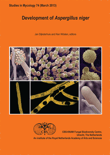
STUDIES IN MYCOLOGY
Fostering Innovation in Mycology ResearchSTUDIES IN MYCOLOGY is a premier journal dedicated to advancing research in the field of mycology, published by the renowned WESTERDIJK FUNGAL BIODIVERSITY INSTITUTE. With an impact factor that places it in the top quartile (Q1) of both Agricultural and Biological Sciences and Plant Science categories, it holds a prestigious position in the scientific community, ranking #1 out of 193 in its field as per Scopus metrics. Since its transition to Open Access in 2008, it has made significant strides in disseminating high-quality research widely, fostering a greater understanding of fungal biodiversity and its ecological impact. Covering a broad spectrum of topics related to mycology, the journal aims to provide researchers, professionals, and students with a platform for sharing innovative findings, stimulating academic discourse, and promoting collaborative efforts within this vital area of study. Hailing from the Netherlands, STUDIES IN MYCOLOGY serves as an invaluable resource for exploring the complexities of fungi, their interactions with various ecosystems, and their practical applications in agriculture and beyond.